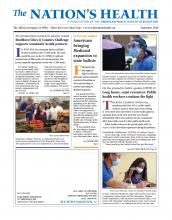Almost half of all pregnancies that occurred globally in recent years were unintended, according to a new study.
The research, published in The Lancet Global Health on July 22, estimated unintended pregnancy and abortion rates by income level, region and other measures. The study was led by the Guttmacher Institute, a research organization advancing women’s health, and the U.N. Human Reproduction Program.
Each year during the 2015-2019 study period, there were about 121 million unintended pregnancies, defined as a pregnancy a woman did not mean to have. Over 70 million of those pregnancies ended in abortion.
“These findings show a clear need for prioritizing a comprehensive approach to essential sexual and reproductive health and rights, including access to safe and legal abortion, which is critical to women's health, particularly during the pandemic and ensuing economic recession,” Herminia Palacio, MD, MPH, president and CEO of the Guttmacher Institute, said during a July telebriefing.
Researchers analyzed data from 166 countries between 1990 and 2019 on pregnancy intentions and abortions. Their findings revealed staggering inequities between women in high-income countries and those in low-income countries. Women in the poorest countries were nearly three times more likely to experience unintended pregnancies than women in the wealthiest countries.
But unplanned pregnancies are experienced by women from all socioeconomic groups, said Jonathan Bearak, PhD, senior research scientist at the Guttmacher Institute and lead author of the study.
“Unintended pregnancy and abortion are reproductive health experiences shared by tens of millions of people around the world, irrespective of personal status or circumstances,” Bearak said in a news release. “What differs are the obstacles people face — for example legal, social and economic obstacles in exercising their reproductive autonomy.”
A major obstacle for women with unplanned and unwanted pregnancies is access to safe abortion. Around the world, two dozen countries do not allow any abortions, while about 40 allow them only when a woman’s life is at risk.
“The tragic paradox is that currently abortion services are most needed where they're least legally available,” Zara Ahmed, DrPH, MPP, MPH, associate director of federal issues at the Guttmacher Institute, said during the telebriefing. “And because abortion is essential health care, people still find ways to get one, even if it means resorting to unsafe methods.”
While unintended pregnancies have declined overall during the past three decades, the abortion rate has returned to levels last seen in the 1990s, the study said. Abortion increased by 12% in countries with highly restricted access, but decreased slightly in regions where it is legal.
“Legal restrictions don't stop abortion from happening,” Bearak said. “They physically, emotionally and financially punish people seeking abortion care, and they disproportionately harm people with the fewest resources.”
Ahmed called for investments in sexual and reproductive health to improve the safety and health of women.
“Abortion is part of a basic human right to control one's reproductive destiny,” she said. “So we think that countries and partners around the world should be investing in sexual and reproductive health and the full package, including access to safe abortion — if they want to ensure that people can control their reproductive autonomy and make the decisions that are best for them and their families.”
For more information on the study, visit www.thelancet.com/journals/langlo.
- Copyright The Nation’s Health, American Public Health Association









